
Rice University today introduced the Rice Biotech Launch Pad, a Houston-based accelerator focused on expediting the translation of the university’s health and medical technology discoveries into cures.

Rice University today introduced the Rice Biotech Launch Pad, a Houston-based accelerator focused on expediting the translation of the university’s health and medical technology discoveries into cures.

Rice researchers earn prestigious Defense Department grants
Rice professors Qimiao Si and Jeffrey Tabor are recipients of prestigious 2023 Vannevar Bush Faculty Fellowships from the Department of Defense.
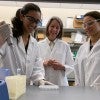
DNA test could broaden access to cervical cancer screening
Rice bioengineers have demonstrated a low-cost, point-of-care DNA test for HPV infections that could make cervical cancer screening more accessible in low- and middle-income countries where the disease kills more than 300,000 women each year.

Neuroengineering’s InterfaceRice 2023 conference draws 160-plus
More than 160 leaders in neurotechnology, neuroscience, neuroengineering and neurosurgery attended InterfaceRice 2023, the inaugural conference of the Rice Neuroengineering Initiative, May 18-19.

Rice, Baylor developing ‘glyco-immune’ checkpoint inhibitor
Researchers from Rice and Baylor College of Medicine are developing a first-of-its-kind “glyco-immune” checkpoint inhibitor for breast cancer survivors who develop metastatic bone cancer.

Duncan, Spiegel honored at Rice360 awards breakfast
The Rice360 Institute for Global Health Technologies presented its 2023 Global Champion Award to philanthropist Jan Duncan and its 2023 Alumni Leadership Award to physician Elizabeth Spiegel ’11 at its graduate recognition and awards breakfast May 5.
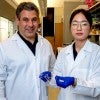
Study unlocks potential breakthrough in Type 1 diabetes treatment
Rice University scientists identified three biomaterial formulations that could help develop a more sustainable, long-term, self-regulating way to treat Type 1 diabetes using a new screening technique that involves tagging each biomaterial formulation in a library of hundreds with a unique “barcode.”
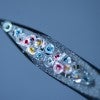
A 21st-century remedy for missed meds
Rice lab’s next-level encapsulation technology for drugs and vaccines could solve a $100 billion problem.

James Chappell wins NSF CAREER Award
Rice bioscientist James Chappell has won a National Science Foundation CAREER Award to develop RNA programming methods that can improve human health and the environment.
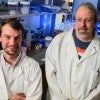
Rice labs seek RNA programming for ‘smart’ antibiotics
Rice University synthetic biologists are working to make “genetically encoded antibiotics” that kill only disease-causing bacteria.

Lillehoj wins NIH grants to develop HIV, Chagas tests
With the $1.8 million in support, Mechanical Engineering's Lillehoj looks to develop a CRISPR-Cas13-based rapid HIV-1 test and a serological test for detecting Chagas.

Hands-free tech adds realistic sense of touch in extended reality
Rice mechanical engineers and their collaborators have demonstrated a new hands-free approach to convey realistic haptic feedback in virtual reality.

Rice scientists reengineer cancer drugs to be more versatile
Rice University scientists enlist widely used cancer therapy systems to control gene expression in mammalian cells, a feat of synthetic biology that could change how diseases are treated.
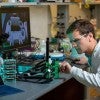
Bite this! Mosquito feeding chamber uses fake skin, real blood
Rice bioengineers teamed up with tropical medicine experts from Tulane to invent a high-tech way to study the feeding behavior of mosquitoes. To eliminate the need for live volunteers, the system uses patches of "synthetic skin" made with a 3D bioprinter.

Rice’s Jamie Padgett wins Texas academy’s O’Donnell Award
Rice University structural engineer Jamie Padgett has received the 2023 Edith and Peter O’Donnell Award in Engineering from The Academy of Medicine, Engineering and Science of Texas.